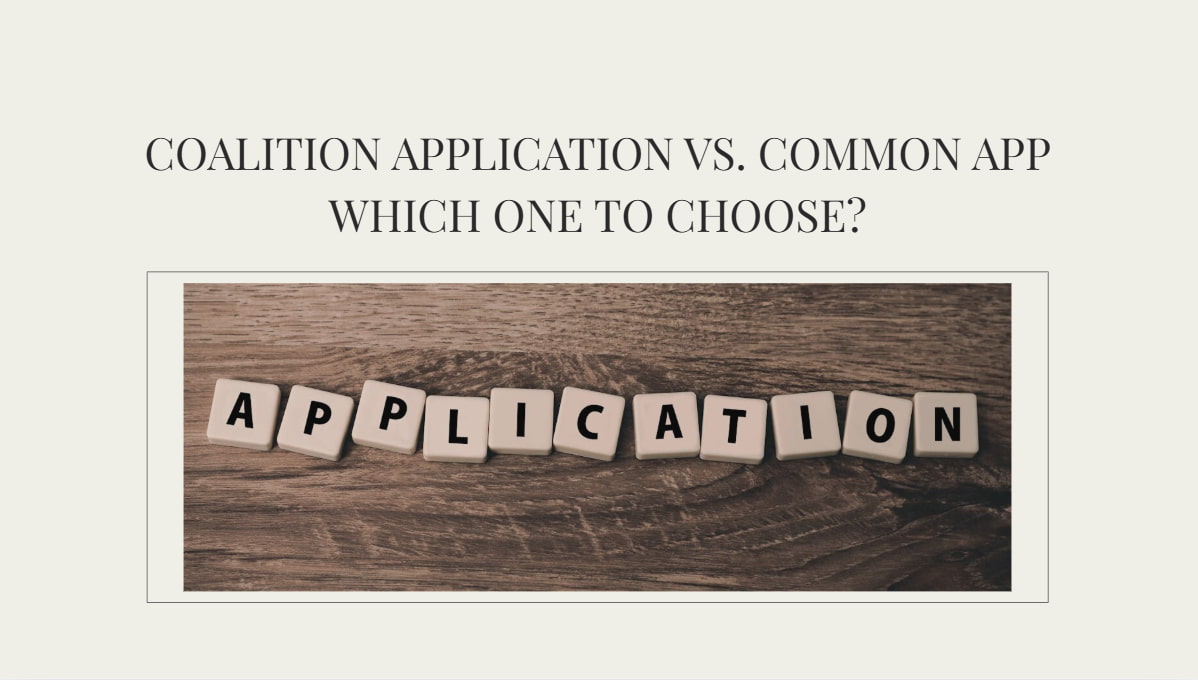When I consult families about college admissions, the Coalition Application vs. Common App is nearly always the first thing that comes up. I believe the misunderstanding comes from the fact that the two apps seem to be the same at first glance.
So, let’s go over everything step by step. I’ll show you how they work in the college application process, what makes them different, and which one could be best for you.
What Is the Common App?
The Common Application, often shortened to “Common App,” has been around since 1975. It started with just 15 schools, but now connects students to over 1,000 institutions worldwide. As I know from general practice, it’s the most popular way for students to apply because it centralizes the whole process.
In my opinion, what makes the Common App so powerful is its simplicity. You fill out your personal information, list your activities, upload essays, and send them off to multiple schools at once.
This application platform also has built-in teacher recommendation requests and financial aid links. For students applying broadly, the Common App saves time and keeps everything in one place.

What Is the Coalition Application?
The Coalition Application, known as the “Coalition App,” is one of the newest platforms in the admissions process. It was founded in 2015 by the Coalition for College, a group of around 150 schools with the same mission: affordability, access, and student success.
From my experience, the Coalition App was created with first-generation and lower-income students in mind. Colleges in the Coalition promise generous aid packages and a more supportive path.
So, what makes it stand out? The Coalition Locker. It’s like your own online portfolio with application materials that you can start using as early as 9th grade. You can save essays, projects, videos, or anything else you’re proud of, and then pull from it when you’re ready to apply.
In my opinion, that’s super helpful if you like staying organized or if you want colleges to see more than just your grades and test scores.
Another big plus is cost. Every Coalition school promises to offer strong financial aid and easy fee waivers, which can take a lot of stress off.
Sure, it has fewer member schools than the Common App, but the ones on it are usually very student-focused and often highly selective.
What Are the Key Differences Between the Common App and Coalition App?
At first, both platforms may look like the same thing: you create an account, fill out personal details, write a personal statement, and submit to multiple colleges. But in reality, there are some important differences.
| FEATURE | COMMON APP | COALITION APP |
|---|---|---|
| Number of schools | 1,000+ colleges (students can use it to apply to up to 20 schools for free, then pay per extra) | ~150 schools (the Coalition App offers fewer than the Common App) |
| Essays | Requires a Common App essay (offers seven prompts) | Also needs an application essay, often similar to the Common App prompts |
| Recommendations | Allows teachers and counselors to submit recommendations directly | A similar system, but with fewer schools, means less variety in how recommendations are handled |
| Cost | Free to create an account; schools set their own fees | Free to use, with guaranteed fee waivers for eligible students |
In the next sections, I’ll go over all the differences, so you can see how each platform actually works for students.
Number of Schools
The Common App is used by over 1,000 colleges, including most Ivy League and highly selective schools.
The Coalition App, however, has only about 150 schools, but those schools are known for having good financial aid programs.
The Coalition App focuses on quality, affordability, and support, whereas the Common App provides you with a lot more options.
College Application Tools and Technology
Both systems are pretty up-to-date when it comes to technology, yet the Coalition App’s Locker allows long-term planning. Meanwhile, the Common App focuses on the actual submission process.
From my point of view, the Locker may be useful for students who want to start preparing early, and the Common App may be better for seniors who are in a rush.
Essays and Prompts
Both applications require a personal statement. The essay prompts often overlap, but sometimes the Coalition’s set feels slightly more open-ended.
Letters of Recommendation
Another important factor is recommendations. The Common App makes it very easy for teachers and counselors to submit letters directly through the platform. Almost every school that uses it expects at least one or two letters.
The Coalition App also accepts recommendations, but since fewer schools use it, there’s a bit less standardization in how they’re handled.
Application Fees and Fee Waivers
Money is another spot where the Coalition App really stands out.
Every school in the Coalition automatically offers fee waivers if you qualify, which takes a lot of pressure off. The Common App has fee waivers, too, but not all colleges and universities are equally generous about them.
From my experience, students who are worried about application costs usually feel more comfortable with the Coalition because the financial support is built in from the start.
Access and Inclusivity
And finally, inclusivity. The Common App is widely available; however, it does not guarantee schools’ affordability policies.
That promise is made by the Coalition App, though. That plan, based on a goal, is appealing to students who want to know that they will have financial help if they need it.
Pros & Cons of Common App and the Coalition App
When you’re figuring out how to apply to college, you’ll notice that the Common App and the Coalition App both have strengths and weaknesses.
From my experience, your choice often depends on your college list and whether affordability or variety matters more.
Common App
Pros
✅ The most widely used college application system in the U.S.
✅ The Common App allows you to apply to up to 20 schools with one account.
✅ The Common App offers seven essay prompts, giving you flexibility.
✅ Familiar to teachers and counselors, making it easier to get help.
Cons
❌ You usually need to pay application fees for each school.
❌ An application fee waiver is available, but generosity varies by college.
❌ Less direct focus on affordability compared to the Common App’s competitor.
Coalition App
Pros
✅ All schools are committed to affordability and policies that make college affordable.
✅ Built-in application fee waiver system.
✅ Coalition Locker helps you store projects and essays over time.
Cons
❌ Smaller platform with fewer schools compared to the Common App.
❌ Less familiar to counselors and students.
❌ Not every school on your college list will accept it.
In short, both platforms help you streamline college applications, but the Common App is more universal. The Coalition App may work better if your target schools are Coalition-exclusive or if you want to take advantage of its planning tools and affordability focus.
Next, let’s talk about how to decide which one fits you best.
Common App vs. Coalition App: Which One to Choose?
One of the trickiest parts of the college admissions process is figuring out which platform works best for you.
Students often ask me whether they should use the Coalition or stick with the Common App. Honestly, the answer depends on your college list and your goals when you apply for college.
If you’re applying to a wide range of schools, I usually recommend using the Common App because it’s accepted almost everywhere and makes it easier to manage multiple college applications in one place.
On the other hand, if affordability and student support are your top priorities, you may prefer to use the Coalition, since all of its schools commit to strong aid programs.
Here’s a simple way to decide:
- Think about the schools on your list. If they all appear on one system, it makes sense to use that.
- Consider your priorities. Do you want as many options as possible, or do you prefer a smaller set of colleges with a strong support focus?
- Ask yourself how much extra work you want. Managing two apps at once can feel overwhelming.
- Talk it through with your counselor. Sometimes they’ll have insights based on past students.
From my experience, colleges don’t care whether you use the Common App or the Coalition App, because they see the same materials either way. What matters most is how strong your essays and recommendations are, and what story you tell elsewhere in your application.
So, when you’re deciding between the Common App and the Coalition App, focus less on the platform and more on how you’ll present yourself. It’s up to you to use that opportunity wisely.
Final Tips
When you start thinking about how to apply to college, the platform can feel like a big decision. In reality, it’s less about choosing between the Common App and Coalition App and more about how you present yourself once you’re inside the system. From my experience, what matters most is the effort you put in as you work on your application.
Remember, college admissions counselors won’t judge you by the system you pick. They want to see authenticity and impact.
So, whichever app you choose, make sure it highlights your strengths. And if you feel stuck, the best college admission consultants can help you polish your materials and boost your confidence.
❔ FAQs About Coalition and Common App
Is the Coalition Application easier than the Common App?
Not really. Both require essays, recommendations, and forms. The difference lies in features like the Coalition Locker.
Do elite schools prefer the Coalition App?
No. While schools like Yale and Princeton accept it, they also accept the Common App.
Can I apply to schools with both the Common App and Coalition App?
Yes, you can use both the Common App and the Coalition App at the same time, but in most cases, it isn’t necessary. Unless a college specifically requires one application system, sticking to a single platform will usually save you time.
Which app is better for first-generation students?
In my opinion, the Coalition App is more tailored to first-gen students because of its mission and affordability guarantees.
Will my chances of admission change depending on which app I use?
No. Admissions decisions are based on your essays, grades, and recommendations, not the platform.

